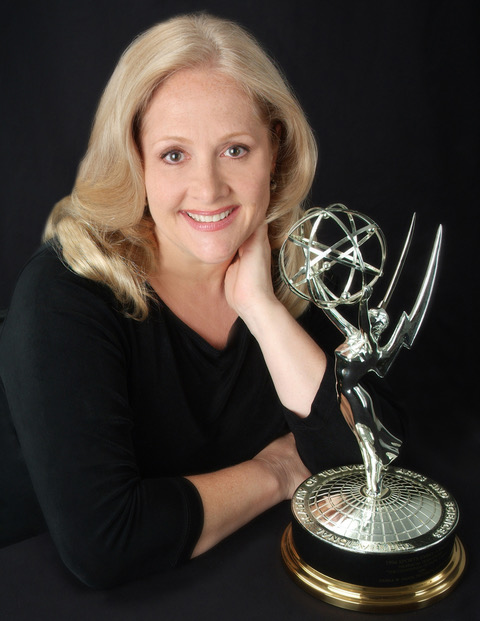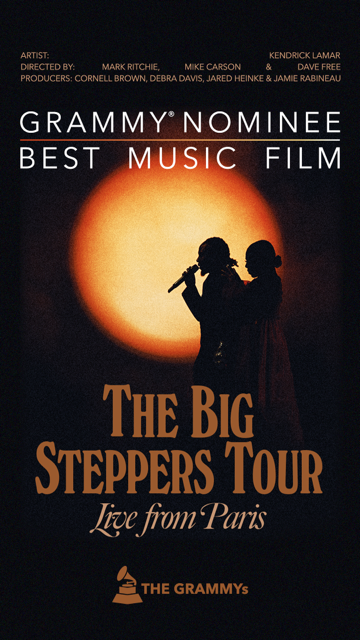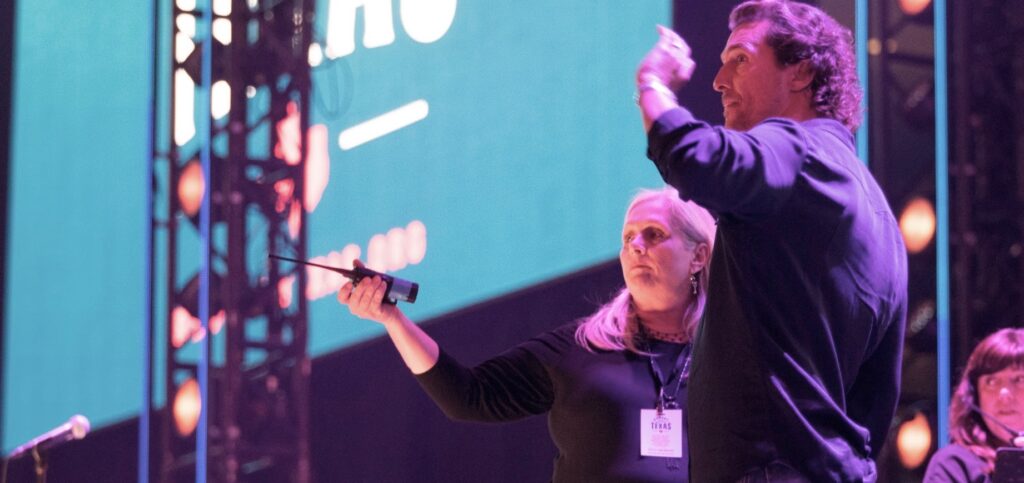Local award-winning producer Debra Davis saw her work validated as the producer of Kendrick Lamar’s legendary Live in Paris, The Big Steppers Tour.

By Hannah Nuñez, Photos courtesy of Debra Davis
On the night of Oct. 22, 2022, fans across the globe tuned in to watch Kendrick Lamar’s broadcast show. As stagehands rushed to hit their cues and the crowd cheered, Debra Davis sat calm and collected amidst the chaos.
Davis is an Emmy award-winning, and Grammy-nominated producer that specializes in live broadcasting. She has branched out into all corners of broadcast production. Making every environment, from corporate award shows to live music, into her own playing field. Her three decades of experience in the industry have made her a go-to pick for artists and companies across the globe looking for precision and care in the craft. Throughout her career, she has collected a plethora of accolades that only emphasize her workmanship. She has 16 consecutive years of producing webcasts for Coachella, Austin City Limits and Lollapalooza festivals, as well as international coverage of four consecutive years of Monte Carlo Circus and the launching of MTV Asia in Singapore.
While Davis has a natural gift, she wasn’t always at the center of the broadcasting industry. In fact, she fought for years for entrance into the rooms she now commands. After graduating from Texas State University, Davis followed her intuition and made the move to New York. She soon began to work at Columbia Pictures in publicity but found herself gravitating more and more toward the filmmakers. “The filmmakers had a creative freedom that I was instantly drawn to. They lived this sort of gypsy lifestyle that was based on the collaboration of artistry. I wanted to go from talking about somebody else’s work to talking about mine.”
With this creativity being a decided goal, she took the first step and quit her job to become a freelancer. “I got on a film, was like the 47th production assistant. My big job was to make the coffee,” she recalls with a laugh that accompanies the humble memory. “I had to get up around 2:30 a.m. to walk in the cold and make coffee. While I absolutely hated it at the time, I knew that I liked the business and just needed to work on changing the circumstances.” Sticking out her time in this position allowed her to gradually progress with the “tribe” she’d formed and begin to explore her newfound love for studio-based television and live events.
Her turning point was meeting Joseph Cates, a master producer and director. He brought her on to shoot the Tony Awards with him for three years. Davis recounts her experience with her late colleague. “Working on the Tonys with Joe is where I discovered the hands-on adrenaline rush I still get today from doing live television. I knew my work had paid off to find where I belonged.” From that moment on, she made a home for herself in broadcasting. She accepted that while her gradual progression may have been tough, it laid the foundation for the rest of her career and many accomplishments that were to come.

Davis and her team worked tirelessly to make the final product of Live in Paris, The Big Steppers Tour a seamless film. But the process to get there was much more than meets the eye. For any production this large, success starts at the core: the team. Six members were first selected from the U.S. and the rest of the crew handpicked across Europe.
“In the last 20 to 30 years, I’ve had a 95% retention rate in my team,” Davis emphasizes. “These are people who’ve grown right alongside me. I know who they are, how they work and how they’re gonna react under the pressure. If it ain’t broke, then don’t fix it.” The show itself tells the story of Kendrick’s character Mr. Morale and his journey through therapy. Unlike many albums these days, there is a clear beginning, middle and end, greatly impacting the entirety of the shoot.
“Kendrick’s creative team had a very distinct vision that was now our job to convey across the globe through a screen,” Davis says. “There had to be a perfect alignment between his team and ours in order to properly tell this story. That meant numerous meetings and constant communication.” Before anyone ever touched a camera, the team did an in-depth study of Kendrick’s story and all elements that played their part to enhance one man on a stage.
Davis spent night after night in the crowd dissecting every movement, light cue and dance number to ensure that nothing went unnoticed or came as a surprise. When they felt well acquainted with the show, 19 meticulously selected cinematic cameras captured every inch and angle of the stage. The night before the broadcast, staff conducted a 10-hour camera meeting to go over every cue, role and all pieces of equipment. Not until all areas of production were double and triple-checked did Davis give the okay to shoot.
“These music events are a one-night opportunity. We have one chance to get it right and really bring our A-game. You have to have the stomach for it, and I thrive off of that stress.” On show nights, with chaos at its peak, Davis stays calm and entrusts that all her work will play out perfectly, setting a standard of excellence. “Once I sit down and that show goes live, responsibility then transitions into the hands of our camera crew and directors. If I were to be up and running around on show day that means something went very wrong.”
So much work is put into behind-the-scenes production, with the sole purpose of nothing being detected on camera. Davis explains this mindset. “There’s a lot of specific details that go into this. But if you notice them, I haven’t done my job right.” Regardless of the stress and pressure put on her, perfection is the standard for Davis. And she has no plan to change that anytime soon.
While Davis happily meets the standards she’s created for herself, she recognizes how being a woman in this industry has added unnecessary expectations onto her plate. “My meetings are probably 80% men and 20% women. I find myself really projecting and working to make my presence known.” Patriarchy isn’t isolated to the production industry. However, the drawbacks of working in such a male-dominated field continue to follow Davis as she grows in success.

“As women, we have to puff up a little bigger and pay attention to things like our stance, verbal reactions and facial expressions. No matter what’s said or the situation, I can’t blink, can’t flinch, can’t ever give a hint of doubt for them to feed off of. I have to project confidence all the time, 24/7. That’s not something a man has to worry about because that respect is already automatically there.”
Davis represents the numerous women affected by gender inequity in the work environment yet prevail regardless of others’ stereotypes. “I already know I got it, and I shouldn’t have to prove that to anyone else. It’s so important to know the gifts you have because once you do, that can never be taken away.” Her motto of pushing forward is obviously working out in her favor, given the recent Grammy nomination for Best Music Film.
For Davis, this nomination is quite the full circle moment, counting her work on the 1990 Radio City Grammy show. This time, she will sit in the audience, a tribute to the hard work that has gotten her there. Though extremely grateful, she’s just as stressed, but not for any reason you may think. “It’s gonna be harder to pick a dress than it was to produce the whole film,” she exclaims with a laugh. The Grammys aren’t the only big plans lined up for Davis. She’s currently working on three different major projects set for release throughout 2024. Her work in broadcasting is a gift to audiences across the globe. A testament to continue to grow regardless of the circumstances.

